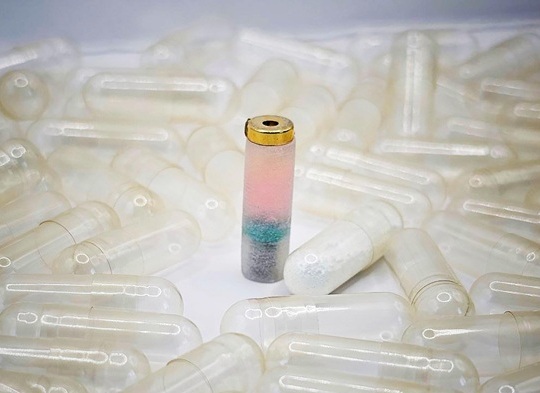Novel S-Layer Intranasal and Oral COVID-19 Vaccine Could Decrease Severity of SARS-CoV-2 Infection
|
By HospiMedica International staff writers Posted on 29 Jun 2020 |

Image: Avalon GloboCare Corp. is developing the S-layer vaccine in partnership with the University of Natural Resources and Life Sciences (Photo courtesy of Avalon GloboCare Corp.)
Scientists are developing a novel S-layer SARS-CoV-2 vaccine that can be administered by an intranasal or oral route and would induce a sufficient immune response to prevent a severe form of COVID-19, which causes morbidity and often mortality.
Avalon GloboCare Corp. (Freehold, NJ, USA), a clinical-stage global developer of cell-based technologies and therapeutics, is developing the S-layer vaccine in partnership with the University of Natural Resources and Life Sciences (BOKU Vienna, Austria). BOKU’s Professor Uwe B. Sleytr, an eminent member of the Austrian Academy of Sciences, is a pioneer of applied surface layer (S-layer) nanotechnology, based on the repetitive protein structures that make up the outer surface of microbial cells. The research is part of an ongoing and broader collaboration between Avalon and BOKU that will utilize S-layer technology to accelerate additional vaccine programs for other respiratory infections including different strains of the flu (influenza A/B), respiratory syncytial virus (RSV), and other viruses. As part of the partnership, Avalon is also actively exploring other practical uses of S-layer technology including targeted drug delivery, diagnostic devices, and therapeutic applications.
The COVID-19 vaccine candidate is derived from a fusion of an S-layer viral particle mimic with the SARS-CoV-2 spike protein and could be delivered non-invasively via the nasal or oral passageways, rather than a needle-based injection into the muscle or under the skin. The S-layer protein-based vaccine is expected to both decrease the severity of a SARS-CoV-2 infection, preventing the more severe respiratory inflammation and organ damage seen in many COVID-19 patients, and build immunity against the virus. The investigators have already made substantial progress by developing the proprietary techniques necessary to synthesize conjugate vaccines consisting of an S-layer artificial viral envelope linked to a viral antigen. As a proof of concept, they have also shown that these types of protein conjugate vaccine candidates are able to elicit immune-protective antibody responses.
“We are encouraged by the progress we have made so far to develop a novel COVID-19 vaccine during this unprecedented world-wide health crisis,” said David Jin, M.D., Ph.D., President and Chief Executive Officer of Avalon GloboCare. “We are working swiftly and diligently with BOKU to complete the laboratory testing and characterization of the S-layer fusion protein SARS-CoV-2 vaccine candidate. We believe that our novel vaccine approach has the potential to be effective. Importantly, this vaccine candidate could be manufactured and delivered more rapidly compared to traditional vaccines, providing access and immunization to a larger population of people around the globe to help combat the COVID-19 pandemic.”
Related Links:
Avalon GloboCare Corp.
University of Natural Resources and Life Sciences
Avalon GloboCare Corp. (Freehold, NJ, USA), a clinical-stage global developer of cell-based technologies and therapeutics, is developing the S-layer vaccine in partnership with the University of Natural Resources and Life Sciences (BOKU Vienna, Austria). BOKU’s Professor Uwe B. Sleytr, an eminent member of the Austrian Academy of Sciences, is a pioneer of applied surface layer (S-layer) nanotechnology, based on the repetitive protein structures that make up the outer surface of microbial cells. The research is part of an ongoing and broader collaboration between Avalon and BOKU that will utilize S-layer technology to accelerate additional vaccine programs for other respiratory infections including different strains of the flu (influenza A/B), respiratory syncytial virus (RSV), and other viruses. As part of the partnership, Avalon is also actively exploring other practical uses of S-layer technology including targeted drug delivery, diagnostic devices, and therapeutic applications.
The COVID-19 vaccine candidate is derived from a fusion of an S-layer viral particle mimic with the SARS-CoV-2 spike protein and could be delivered non-invasively via the nasal or oral passageways, rather than a needle-based injection into the muscle or under the skin. The S-layer protein-based vaccine is expected to both decrease the severity of a SARS-CoV-2 infection, preventing the more severe respiratory inflammation and organ damage seen in many COVID-19 patients, and build immunity against the virus. The investigators have already made substantial progress by developing the proprietary techniques necessary to synthesize conjugate vaccines consisting of an S-layer artificial viral envelope linked to a viral antigen. As a proof of concept, they have also shown that these types of protein conjugate vaccine candidates are able to elicit immune-protective antibody responses.
“We are encouraged by the progress we have made so far to develop a novel COVID-19 vaccine during this unprecedented world-wide health crisis,” said David Jin, M.D., Ph.D., President and Chief Executive Officer of Avalon GloboCare. “We are working swiftly and diligently with BOKU to complete the laboratory testing and characterization of the S-layer fusion protein SARS-CoV-2 vaccine candidate. We believe that our novel vaccine approach has the potential to be effective. Importantly, this vaccine candidate could be manufactured and delivered more rapidly compared to traditional vaccines, providing access and immunization to a larger population of people around the globe to help combat the COVID-19 pandemic.”
Related Links:
Avalon GloboCare Corp.
University of Natural Resources and Life Sciences
Latest COVID-19 News
- Low-Cost System Detects SARS-CoV-2 Virus in Hospital Air Using High-Tech Bubbles
- World's First Inhalable COVID-19 Vaccine Approved in China
- COVID-19 Vaccine Patch Fights SARS-CoV-2 Variants Better than Needles
- Blood Viscosity Testing Can Predict Risk of Death in Hospitalized COVID-19 Patients
- ‘Covid Computer’ Uses AI to Detect COVID-19 from Chest CT Scans
- MRI Lung-Imaging Technique Shows Cause of Long-COVID Symptoms
- Chest CT Scans of COVID-19 Patients Could Help Distinguish Between SARS-CoV-2 Variants
- Specialized MRI Detects Lung Abnormalities in Non-Hospitalized Long COVID Patients
- AI Algorithm Identifies Hospitalized Patients at Highest Risk of Dying From COVID-19
- Sweat Sensor Detects Key Biomarkers That Provide Early Warning of COVID-19 and Flu
- Study Assesses Impact of COVID-19 on Ventilation/Perfusion Scintigraphy
- CT Imaging Study Finds Vaccination Reduces Risk of COVID-19 Associated Pulmonary Embolism
- Third Day in Hospital a ‘Tipping Point’ in Severity of COVID-19 Pneumonia
- Longer Interval Between COVID-19 Vaccines Generates Up to Nine Times as Many Antibodies
- AI Model for Monitoring COVID-19 Predicts Mortality Within First 30 Days of Admission
- AI Predicts COVID Prognosis at Near-Expert Level Based Off CT Scans
Channels
Critical Care
view channel
AI Heart Attack Risk Assessment Tool Outperforms Existing Methods
For decades, doctors have relied on standardized scoring systems to assess patients with the most common type of heart attack—non-ST-elevation acute coronary syndrome (NSTE-ACS). The GRACE score, used... Read more
'Universal' Kidney to Match Any Blood Type
Blood-type incompatibility has long been one of the greatest obstacles in organ transplantation, forcing thousands of patients—particularly those with type O blood—to wait years longer for compatible donors.... Read moreSurgical Techniques
view channel
Minimally Invasive Endoscopic Surgery Improves Severe Stroke Outcomes
Intracerebral hemorrhage, a type of stroke caused by bleeding deep within the brain, remains one of the most challenging neurological emergencies to treat. Accounting for about 15% of all strokes, it carries... Read more
Novel Glue Prevents Complications After Breast Cancer Surgery
Seroma and prolonged lymphorrhea are among the most common complications following axillary lymphadenectomy in breast cancer patients. These postoperative issues can delay recovery and postpone the start... Read morePatient Care
view channel
Revolutionary Automatic IV-Line Flushing Device to Enhance Infusion Care
More than 80% of in-hospital patients receive intravenous (IV) therapy. Every dose of IV medicine delivered in a small volume (<250 mL) infusion bag should be followed by subsequent flushing to ensure... Read more
VR Training Tool Combats Contamination of Portable Medical Equipment
Healthcare-associated infections (HAIs) impact one in every 31 patients, cause nearly 100,000 deaths each year, and cost USD 28.4 billion in direct medical expenses. Notably, up to 75% of these infections... Read more
Portable Biosensor Platform to Reduce Hospital-Acquired Infections
Approximately 4 million patients in the European Union acquire healthcare-associated infections (HAIs) or nosocomial infections each year, with around 37,000 deaths directly resulting from these infections,... Read moreFirst-Of-Its-Kind Portable Germicidal Light Technology Disinfects High-Touch Clinical Surfaces in Seconds
Reducing healthcare-acquired infections (HAIs) remains a pressing issue within global healthcare systems. In the United States alone, 1.7 million patients contract HAIs annually, leading to approximately... Read moreHealth IT
view channel
Printable Molecule-Selective Nanoparticles Enable Mass Production of Wearable Biosensors
The future of medicine is likely to focus on the personalization of healthcare—understanding exactly what an individual requires and delivering the appropriate combination of nutrients, metabolites, and... Read moreBusiness
view channel
Philips and Masimo Partner to Advance Patient Monitoring Measurement Technologies
Royal Philips (Amsterdam, Netherlands) and Masimo (Irvine, California, USA) have renewed their multi-year strategic collaboration, combining Philips’ expertise in patient monitoring with Masimo’s noninvasive... Read more
B. Braun Acquires Digital Microsurgery Company True Digital Surgery
The high-end microsurgery market in neurosurgery, spine, and ENT is undergoing a significant transformation. Traditional analog microscopes are giving way to digital exoscopes, which provide improved visualization,... Read more
CMEF 2025 to Promote Holistic and High-Quality Development of Medical and Health Industry
The 92nd China International Medical Equipment Fair (CMEF 2025) Autumn Exhibition is scheduled to be held from September 26 to 29 at the China Import and Export Fair Complex (Canton Fair Complex) in Guangzhou.... Read more

















